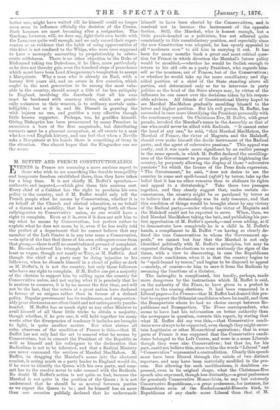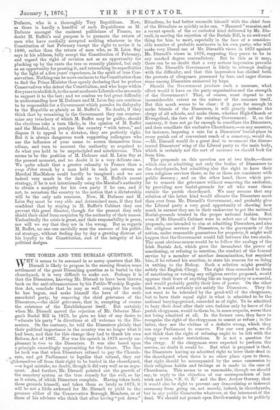M. BUFFET AND FRENCH CONSTITUTIONALISM.
EVENTS in France are assuming a more anxious aspect to those who wish to see something like durable tranquillity and temperate freedom established there, than they have taken for a long time. It is not chiefly M. Buffet's speeches,— authentic and imputed,—which give them this anxious cast. Every chief of a Cabinet has the right to proclaim his own policy to the country, and if M. Buffet would only tell the French people what he means by Conservatism, whether it is on behalf of the Church and clerical education, or on behalf of a throne and a nobility, that he is putting forth all these rallying-cries to Conservative union, no one would have a right to complain. Even as it is, even if it does not suit him to say what he means by Conservatism, but prefers rather to explain what he does not mean by it, even if he has really told the prefect of a department that he cannot believe that any member of the Left Centre is in any true sense a Conservative, —in spite of the fact that three of his own colleagues come from that group,—there is still no constitutional ground of complaint. Mr. Disraeli achieved his triumph in 1874 on principles at least as vague, though not nearly so Tory, as M. Buffet's. And though the chief of a party may be doing injustice to his followers, when he shrouds himself in a cloud of policy as dark as M. Buffet's, it is not the country, but only those followers who have any right to complain. If M. Buffet can get a majority of the electors to support him by calling upon the country for Conservative union, and not saying what it is precisely that he is anxious to conserve, it is by no means the first time, and will not be the last, that the voters of a great nation have declared in favour of an enigma rather than in favour of a defined policy. Popular government has its weaknesses, and unquestion- ably great electorates are often timid and not unfrequently puzzle- headed. M. Buffet has as much right as any other Minister to avail himself of all these little tricks to obtain a majority, though whether, if he gets one, it will hold together for many weeks after the divergencies of tendency it includes are brought to light, is quite another matter. But what alarms all calm observers of the condition of France is this,—that M. Buffet has not only had the art to conceal what he means by Conservatism, but to commit the President of the Republic as well as himself and his colleagues to the declaration that Radicalism is not to be tolerated, and that a Radical Ministry can never command the services of Marshal MacMahon. M. Buffet, in dragging the Marshal's name into the electoral combat, is acting much as a party leader in England would do, if he were to identify the Queen with his own party, and com- mit her to the resolve never to take counsel with the Radicals. No doubt M. Buffet's action is not quite so bad, because the Marshal is not quite in the position of the Queen ; it is not understood that he should be as neutral between parties as we expect the Queen to be ; and he himself has on more than one occasion publicly declared that he understands himself to have been elected by the Conservatives, and is resolved not to become the instrument of the opposite faction. Still, the Marshal, who is honest enough, but a little puzzle-headed as a politician, has not adhered quite consistently to this unsatisfactory position, and especially since the new Constitution was adopted, he has openly appealed to all " moderate men" to aid him in carrying it out. It has been for many months back a great and most critical ques- tion for France in which direction the Marshal's future policy would be moulded,—whether he would be foolish enough to return to his old role as a party President, who regards him- self as the nominee, not of France, but of the Conservatives; or whether he would take up the more conciliatory and dig- nified position of a chief of the State standing above all parties, and determined only so far to intervene in party politics as the head of the State always may, by virtue of the influence he can assert over the decisions taken by his respon- sible advisers. All friends of Constitutional liberty hoped to see Marshal MacMahon gradually moulding himself to the latter and higher position. But his evil genius, M. Buffet, has succeeded in once more identifying the President personally with the reactionary creed. On Christmas Eve, M. Buffet, with great parade, invoked the Marshal's name in the Assembly as that of one who could never be allied with Radicals. " It cannot enter the head of any one," he said, "that Marshal MacMahon, the Marshal of France, the victor of Magenta and the Malakoff, should ever make himself the docile instrument of the Radical party, and the agent of subversive passions?' This appeal was crafty, and it was made more significant by an earlier passage in the same speech, in which M. Buffet declared the unwilling- ness of the Government to pursue the policy of frightening the country, by purposely allowing the display of those " subversive passions" for which the license of the Press finds expression. " The Government," he said, " does not desire to see the country in some sort spell-bound (afole') by terror, take up the belief that it has no other resource than to abdicate its rights and appeal to a dictatorship." Take these two passages together, and they clearly suggest that, under certain cir- cumstances, the country might be so paralysed by terror as to believe that a dictatorship was its only resource, and that this condition of things would be brought about by any victory of the Radical party,--,under whom the victor of Magenta and the Malakoff could not be expected to serve. When, then, we find Marshal MacMahon taking the bait, and publishing his per- fect approbation of M. Buffet's speech,—and even adding, as if to demonstrate how completely he is a child in M. Buffet's hands, a compliment to M. Buffet " on having so clearly de- fined the true Conservatives to whom the Government ap- peals," we cannot but fear that the Marshal is not only identified politically with M. Buffet's principles, but may be expected during the elections to scan anxiously the signs of the times, with a view to discovering, in case the Republicans carry their candidates, when it is that the country begins to be "spell-bound by terror," and begins to be disposed to appeal —mutely, of course—to him to save it from the Radicals by assuming the functions of a dictator.
The imbroglio is complicated, but hardly, perhaps, made more dangerous by the instructions which M. Buffet is said, on the authority of the Times, to have given to a prefect in regard to the coming elections. It had been rumoured in a Liberal paper—La France—that M. Buffet had desired this pre- fect to support the Orleanist candidates where he could, and then the Bonapartista where he had no choice except between Re- publicans and Bonapartists. The Times correspondent, who seems to have had his information on better authority than the newspaper in question, corrects this report, by stating that what M. Buffet did say was this,—that Conservative candi- dates were always to be supported, even though they might enter- tain Legitimist or other Monarchical aspirations; that in some parts of France it was supposed that the Conservative candi- dates belonged to the Left Centre, and were in a sense Liberals though they were also Conservatives ; but that he, for his part, could not believe this, since to him the words "Liberal " and Conservative" represented a contradiction. Clearly this speech must have been filtered through the minds of two distinct reporters, and may have been materially modified in the pro- cess. But allowing for such modifications, it doubtless ex- pressed, even in its original shape, what the Christmas-Eve speech also expressed, though less distinctly,—a great preference for genuinely Conservative Monarchists, to any but extremely Conservative Republicans,—a great preference, for instance, for Monarchists even of the. Rochefoucauld-Bisaccia kind, to Republicans of any shade more Liberal than that of M.
Dufaure, who is a thoroughly Tory Republican. Now, as there is hardly a handful of such Republicans as M. Dufaure amongst the eminent politicians of France, no doubt M. Buffet's real purpose is to promote the return of men who have cordially accepted nothing whatever in the Constitution of last February except the right to revise it in
-) 1880, rather than the return of men who, as M. Leon Say says in his address, fully accept the Constitution of February, and regard the right of revision not as an opportunity for plucking up by the roots the tree so recently planted, but only as an opportunity for pruning it, and retrenching its superfluities by the light of a five years' experience, in the spirit of true Con- servatism. Nothing can be more ominous to the Constitution than to find the Prime Minister thus openly declaring that he prefers Conservatives who detest the Constitution, and who hope within five years to abolish it, to the most moderate Liberals who are ready to support it to the last; and we confess we feel great difficulty in understanding how M. Dufaure and M. Leon Say can continue to be responsible for a Government which parades its disloyalty to the Republic so plainly as M. Buffet's. No doubt, if they think that by remaining in the Government they can counter- mine any treachery of which M. Buffet may be guilty, should the elections take a turn likely, in the opinion of M. Buffet and the Marshal, to paralyse the country " with terror," and dispose it to appeal to a dictator, they are perfectly right. But it is always dangerous work supporting colleagues who use the influence of your name to screen theinselves from odium, and turn to account the authority so acquired to do what you hold to be unprincipled and mischievous. This seems to be the position of M. Dufaure and M. Leon Say at the present moment, and no doubt it is a very delicate one. We quite admit that a greater calamity to France than a coup d'e'tat struck by a man held in such just esteem as Marshal MacMahon could hardly be imagined ; and we are indeed very much in the dark as to M. Buffet's recent strategy, if he is not intentionally using the Marshal's authority to obtain a majority for his own party if he can, and if not, to accustom the country to the notion that a dictatorship will be the only safe resource. Now, M. Dufaure and M. Leon Say must be very able and determined men, if they feel confident that by staying in M. Buffet's Cabinet they can prevent this great disaster, though for the present they only shield their chief from suspicion by the authority of their names. Undoubtedly the crisis is great, and their responsibility is great, nor will we say that they are in the wrong. But as regards M. Buffet, no one can carefully scan the nuances of his politi- cal strategy, without feeling day by day a growing distrust of his loyalty to the Constitution, and of the integrity of his political designs.











































 Previous page
Previous page